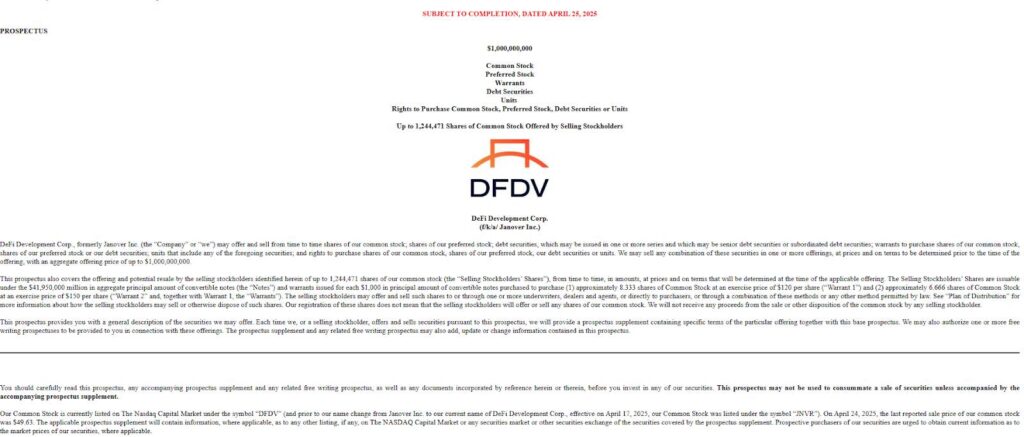In a bold move redefining its investment strategy, DeFi Development Corp, previously known as Janover, has set its sights on raising over $1 billion in capital, primarily aimed at investing in Solana, the sixth-largest cryptocurrency by market capitalization. This announcement comes in the wake of their Form S-3 registration statement filed with the US Securities and Exchange Commission (SEC) on April 25, indicating the company’s intention to delve into crypto assets to bolster its corporate finances.
The Nasdaq-listed firm, which transitioned from a real estate financing platform to its current focus, aims to use the proceeds not just for general corporate needs but also for direct acquisitions of Solana (SOL) tokens. While Solana itself does not offer interest, the company highlighted potential returns through staking rewards, tying its investment success to the asset’s future price appreciation.
“The ability to generate a return on investment from the net proceeds from this offering will depend on whether there is appreciation in the value of Solana following our purchases,” the filing noted.
Recent developments within DeFi Development Corp have seen significant changes in leadership, propelled by a team of former Kraken exchange executives who acquired notable shares in the company. Joseph Onorati, the newly appointed CEO, aims to steer the company into this unchartered territory of crypto investments. DeFi Development’s venture into Solana has been likened to Michael Saylor’s Bitcoin strategy, emphasizing the potential for traditional finance to embrace the crypto realm.
While this shift represents an exciting opportunity for both the firm and its investors, the landscape remains riddled with uncertainties. The regulatory environment surrounding cryptocurrencies poses risks that could impact Solana’s price and, consequently, DeFi Development Corp’s market performance. The company has expressed concerns over uncertain crypto regulations that might affect its operations and overall financial health, especially regarding the classification of Solana as a security.
“We may be subject to regulatory developments related to crypto assets and crypto asset markets, which could adversely affect our business, financial condition, and results of operations,” they stated in the filing.
DeFi Development Corp’s Strategic Shift to Solana Investment
DeFi Development Corp (formerly Janover) is making headlines with its plans to raise substantial capital for investing in Solana. Here are the key points that highlight this strategic shift and its potential implications:
- Capital Raising Plans:
- Targeting over $1 billion in capital for Solana investments.
- Funds will be invested in Solana (SOL) token acquisitions.
- Regulatory Filings:
- Filed Form S-3 with the SEC to formalize funding plans.
- Stated that proceeds may convert to cash if necessary, potentially at a loss.
- Investment Strategy:
- Company adopts a Solana treasury reserve modeled after successful public-market strategies.
- Engages in staking rewards to generate returns from Solana investments.
- Leadership Changes:
- New leadership from Kraken exchange is steering the company towards this new direction.
- Joseph Onorati appointed as CEO, with a focus on cryptocurrency investments.
- Market Concerns:
- Potential regulatory issues could negatively impact both Solana’s price and the company’s financial stability.
- Concerns exist over the classification of Solana as a security under federal regulations.
- Impact on Market Sentiment:
- Positive share price movement following Solana acquisitions indicates confidence among investors.
- Other businesses might follow DeFi Development Corp’s lead, impacting wider market adoption of cryptocurrency.
“The decision by commercial property platform Janover to add SOL to its treasury is truly groundbreaking.”
DeFi Development Corp’s Bold Move into Solana: Opportunities and Challenges
The recent maneuvers by DeFi Development Corp, formerly known as Janover, to secure over $1 billion for investing in Solana represent a striking shift in strategy for a firm previously focused on real estate financing. This change not only highlights DeFi Development Corp’s ambition within the burgeoning cryptocurrency space but also exposes it to potential risks that resemble challenges faced by other market players.
Comparative Advantages: One of the monumental advantages for DeFi Development Corp lies in its innovative treasury model, akin to that employed by MicroStrategy’s Michael Saylor, which has seen massive success in Bitcoin accumulation. By creating a Solana treasury and launching validators, the firm positions itself to earn staking rewards, thus enhancing potential returns on its investments. The strategic pivot towards a prominent crypto asset like Solana opens new avenues for growth and diversification, making it a compelling player in the cryptocurrency landscape.
Furthermore, the firm’s focus on Solana indicates a bet on an altcoin that has showcased remarkable scalability and lower fees compared to Ethereum, which could cater to developers and businesses looking for efficient blockchain solutions. This positions DeFi Development Corp advantageously as other traditional finance platforms begin to embrace crypto, echoing sentiments shared by industry leaders about the inevitable convergence of the two sectors.
Disadvantages and Risks: However, DeFi Development Corp is not without its hurdles. The unpredictable nature of the cryptocurrency market poses significant risks, particularly with Solana’s price volatility. As noted by the firm itself, there’s apprehension regarding potential future classification of Solana as a security, which could impose strict regulatory frameworks detrimental to operations and valuation. This reflective caution mirrors the struggles faced by companies in crypto space—including ongoing battles with regulation that stifle market confidence.
Additionally, while staking rewards can present lucrative returns, the dependence on token appreciation means that the firm’s fortunes are closely tied to market sentiment. A drop in Solana’s price may yield cash conversion at a lost value, a predicament that has been evident in the wider cryptocurrency market. Such scenarios could adversely affect investor confidence and DeFi Development Corp’s stock performance, a concern echoed in the filings submitted to the SEC.
Audience Impact: For traditional investors intrigued by cryptocurrency, DeFi Development Corp’s pivot towards Solana offers new investment excitement and the possibility of attractive returns. However, the inherent risks could deter risk-averse investors. Furthermore, competitors in the cryptocurrency space may feel pressured to accelerate their own treasury strategies or to venture into popular altcoins, potentially altering the competitive landscape.
Ultimately, while DeFi Development Corp’s bold step into Solana investment holds promise for capturing market attention and generating revenue amid a rapidly evolving digital finance environment, the company must navigate the complex terrain of cryptocurrency regulations and market fluctuations with caution.

















